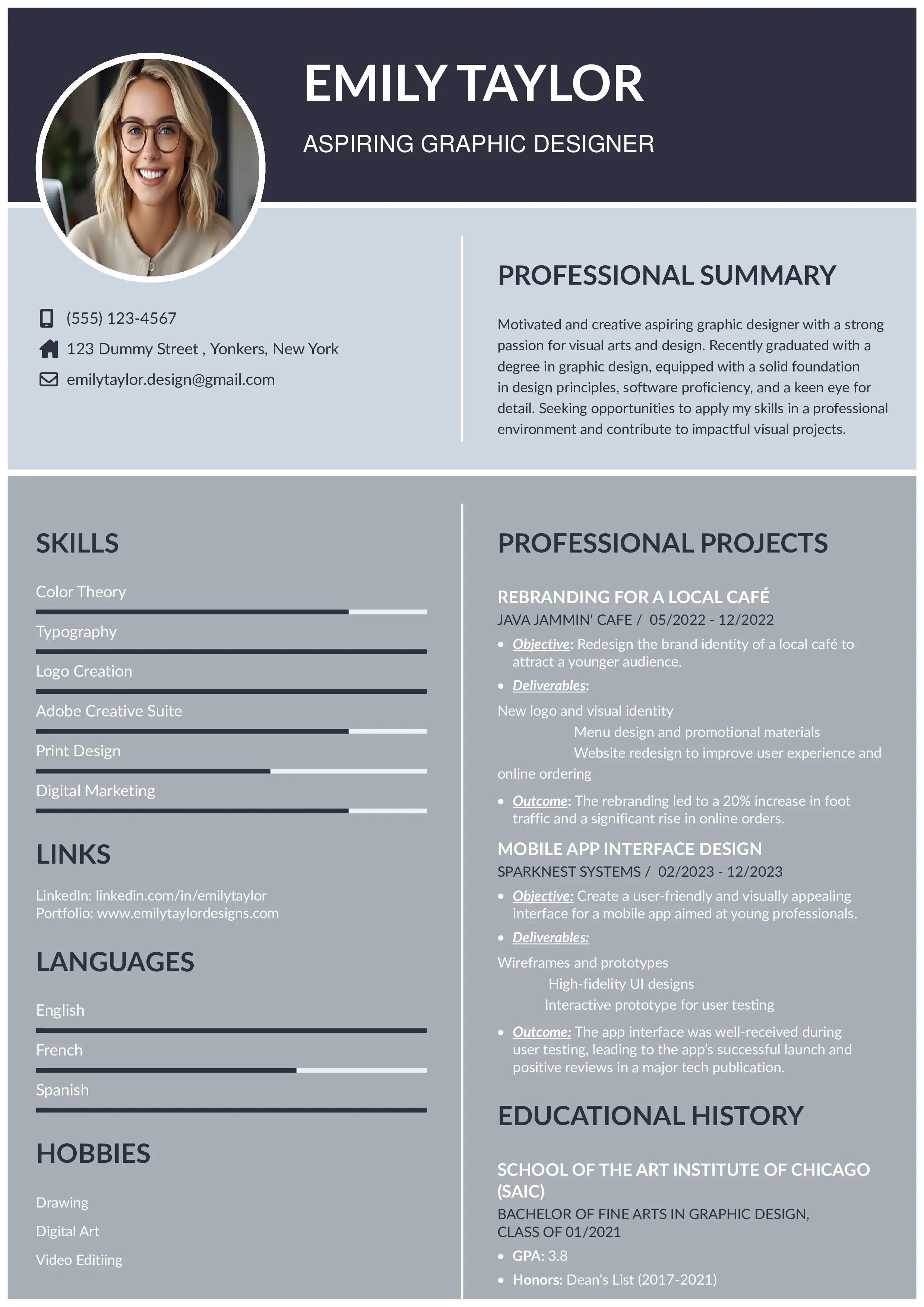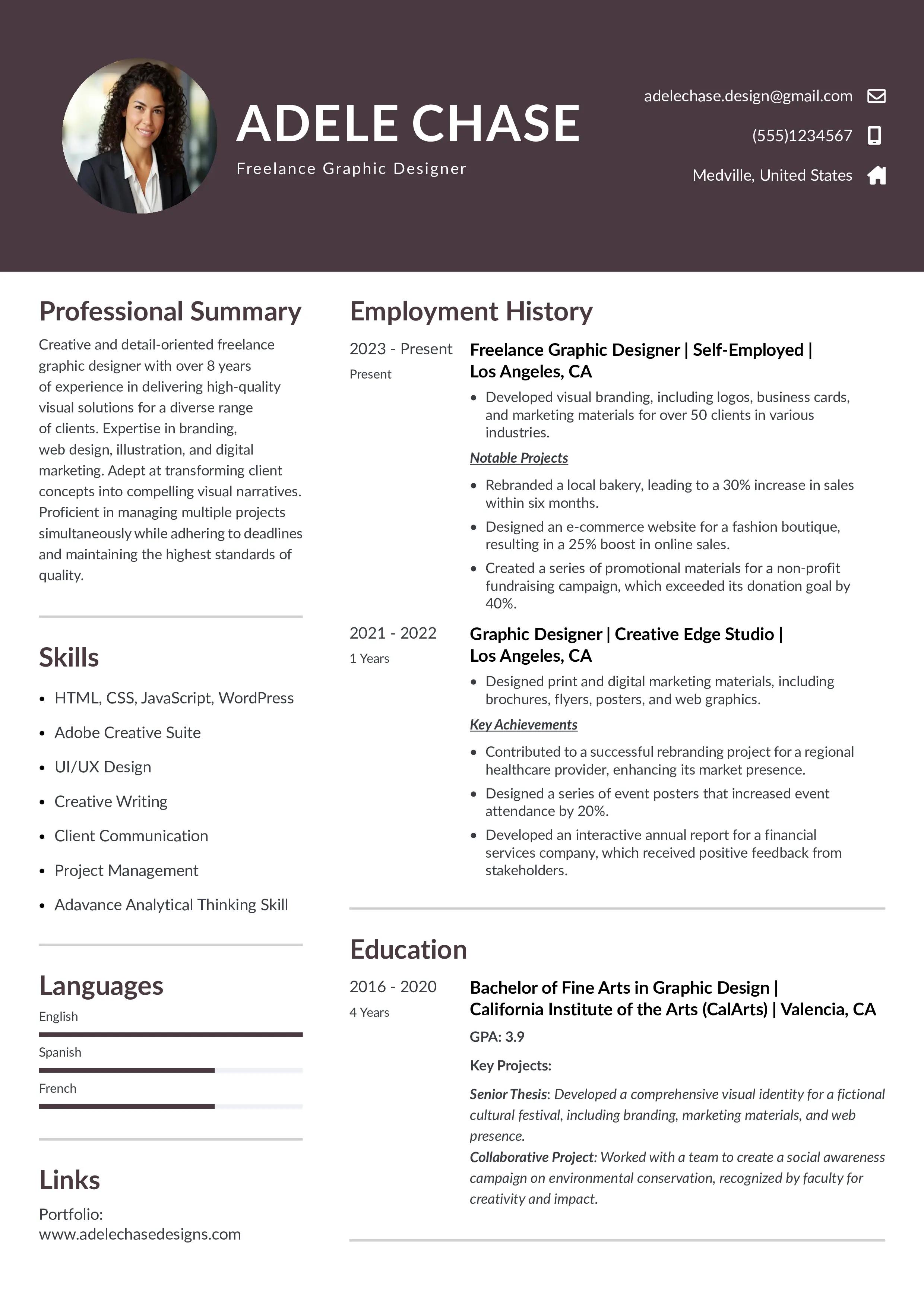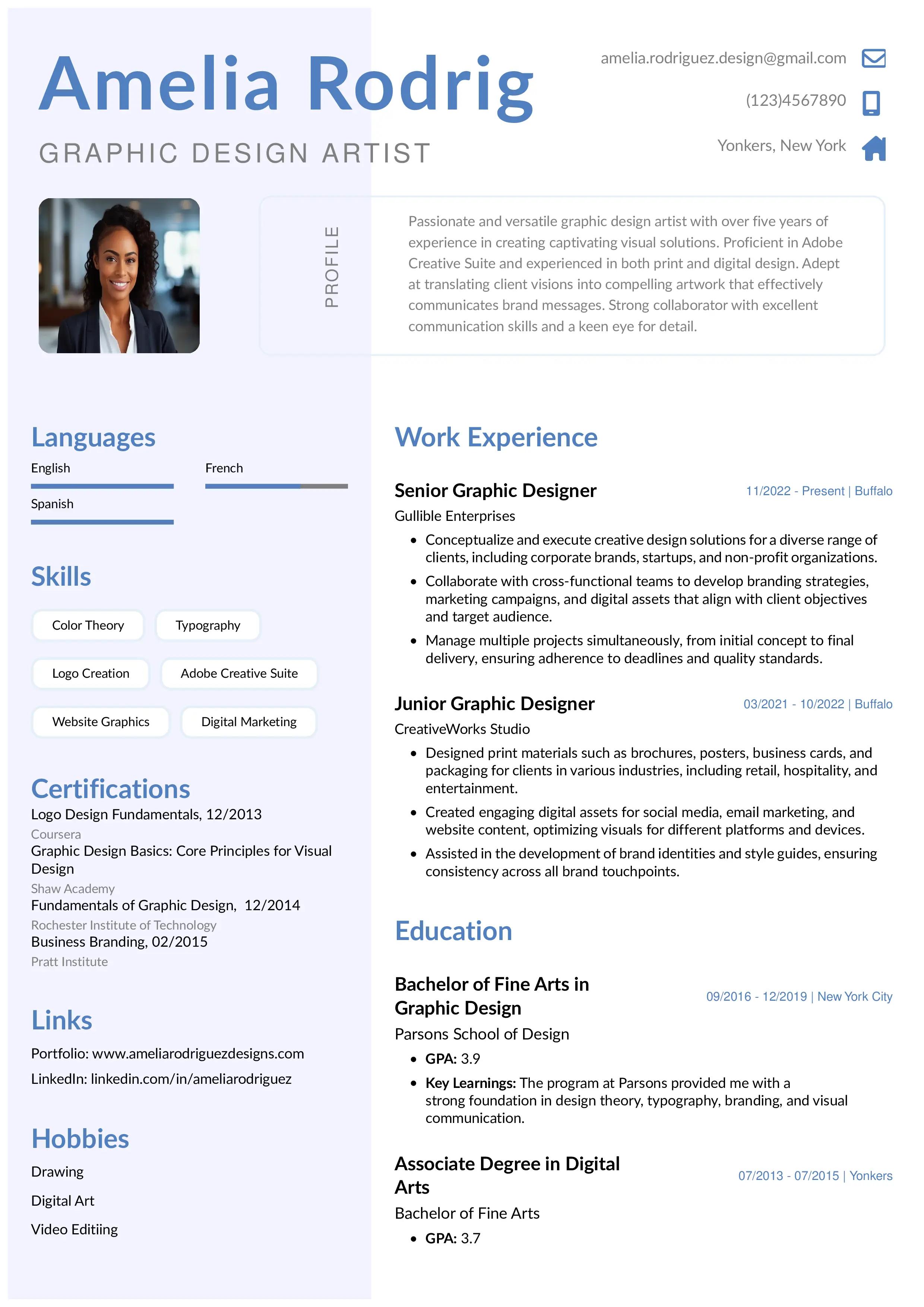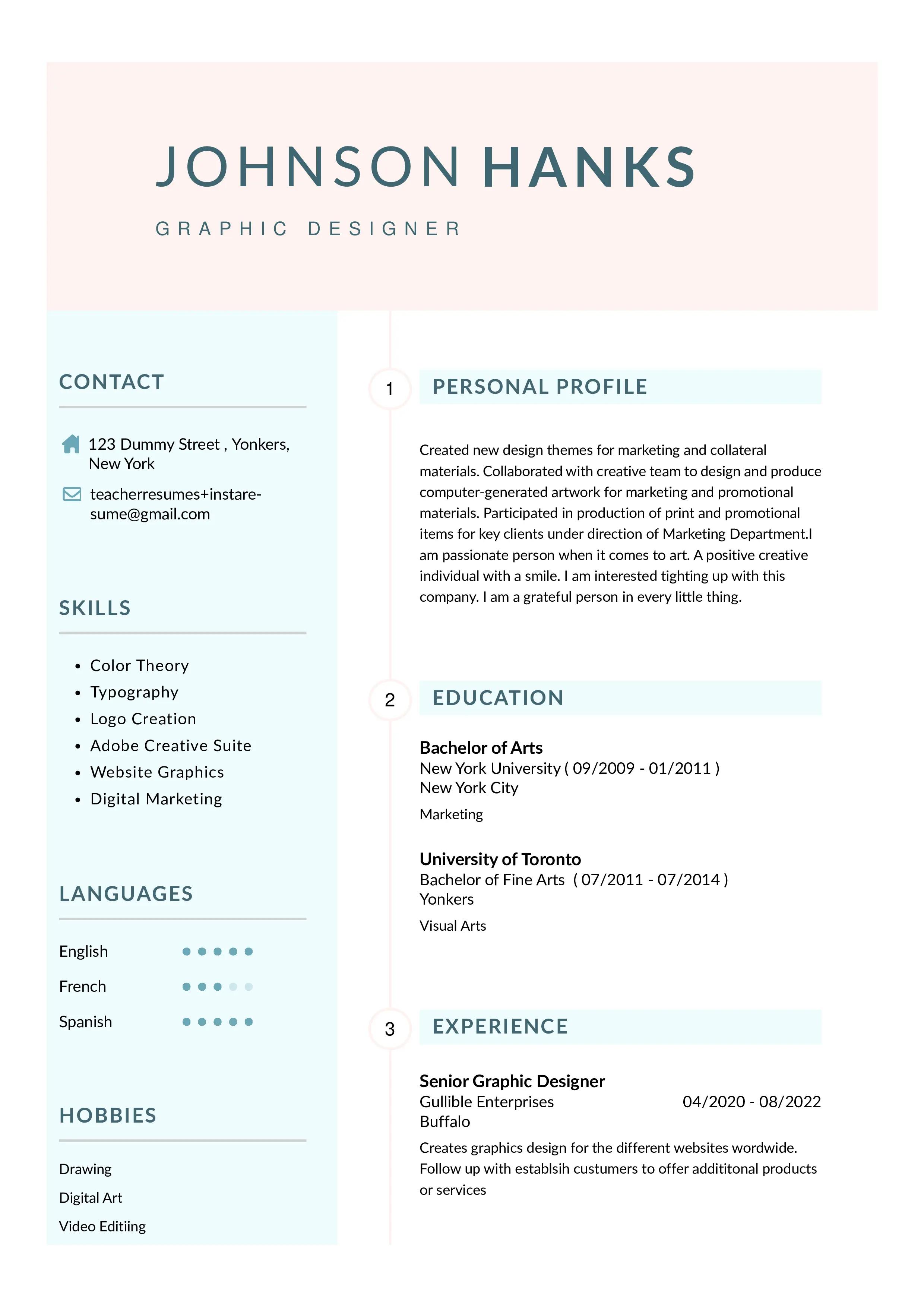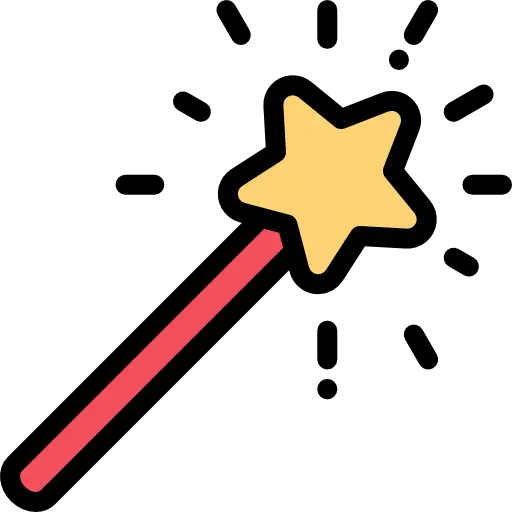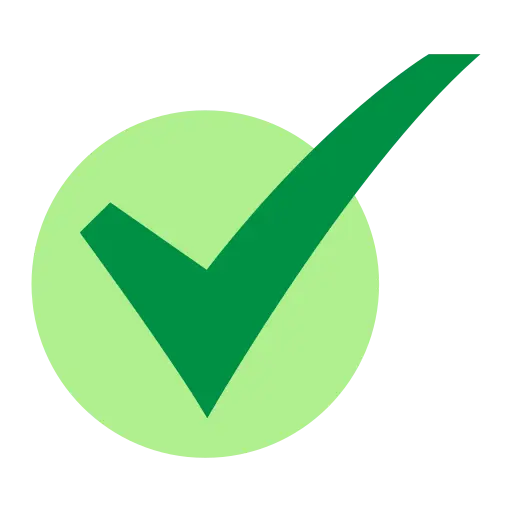Graphic designer resume examples 2024
Trust Score: 4.7
358 reviews
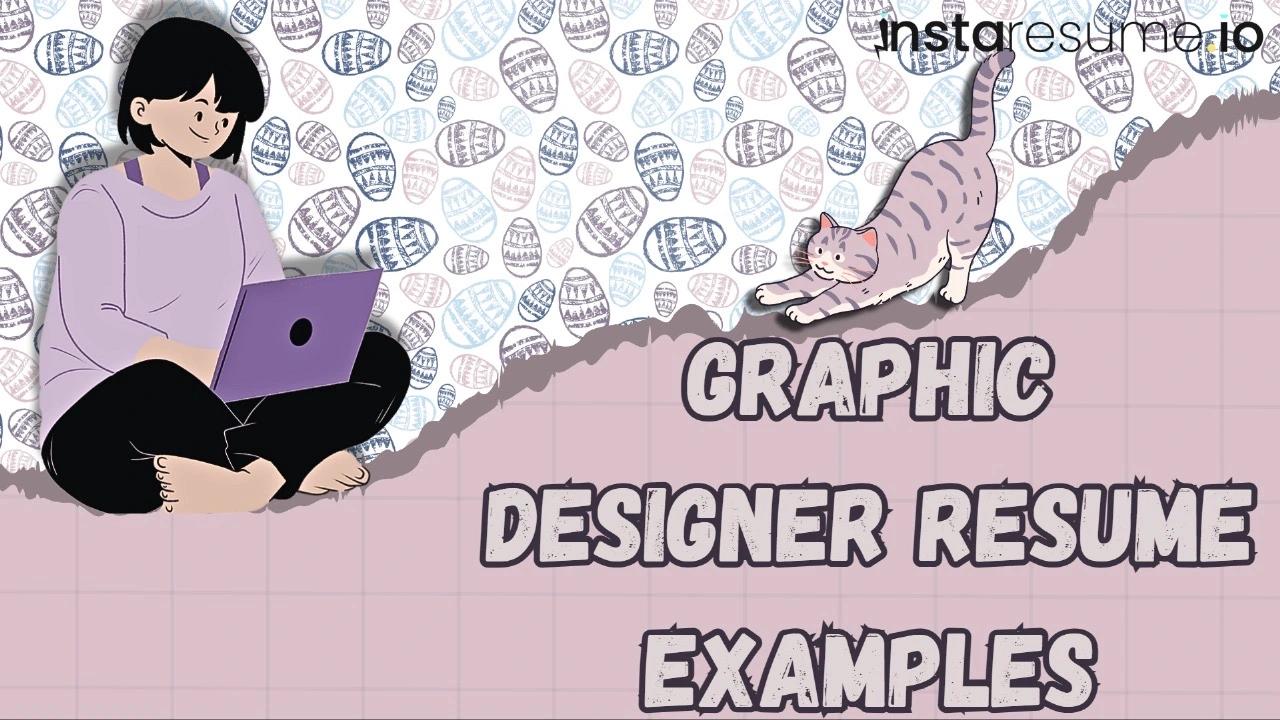
Table of Contents
In the competitive field of graphic design, your resume is often the first impression you make on potential employers. A well-crafted resume is essential to showcase your creativity, technical skills, and professional experience effectively. Just as your design work needs to catch the eye of a potential client or employer, so too does your resume need to stand out in a stack of applications.
This blog will provide comprehensive guidance on formatting a graphic design resume, including examples and tips to make your resume stand out. Whether you're a seasoned designer looking to update your resume or a newcomer preparing to enter the industry, these insights will help you create a document that truly reflects your talents and potential.
Resume formatting tips for a graphic design resume
When it comes to creating a resume for a graphic design position, the importance of clean, professional formatting cannot be overstated. Your resume should not only convey your qualifications and experience but also reflect your design sensibilities. A well-organized and aesthetically pleasing resume demonstrates your attention to detail, ability to communicate visually, and understanding of design principles. It's your first opportunity to show employers your style and professionalism.
Sections to include
To ensure your resume covers all necessary information while remaining visually appealing, it should include the following key sections:
Contact Information
 Your full name
Your full name Phone number
Phone number Email address
Email address LinkedIn profile (if applicable)
LinkedIn profile (if applicable) Professional website or online portfolio link
Professional website or online portfolio link
Summary
 A brief, impactful statement summarizing your professional background, key skills, and career objectives. This section should be concise, typically no more than 2-3 sentences.
A brief, impactful statement summarizing your professional background, key skills, and career objectives. This section should be concise, typically no more than 2-3 sentences.
Skills section
 A list of relevant technical and soft skills. This can include software proficiency (e.g., Adobe Creative Suite), design skills (e.g., typography, layout), and other abilities (e.g., project management, communication).
A list of relevant technical and soft skills. This can include software proficiency (e.g., Adobe Creative Suite), design skills (e.g., typography, layout), and other abilities (e.g., project management, communication).
Experience section
 Detailed descriptions of your professional work history, listed in reverse chronological order. For each position, include:
Detailed descriptions of your professional work history, listed in reverse chronological order. For each position, include: Job title
Job title Company name
Company name Location
Location Dates of employment
Dates of employment Key responsibilities and achievements
Key responsibilities and achievements
Education section
 Information about your academic background, including:
Information about your academic background, including: Degree(s) obtained
Degree(s) obtained School name
School name Graduation year
Graduation year Relevant coursework or honors (if applicable)
Relevant coursework or honors (if applicable)
Portfolio Links
 A link to your online portfolio where potential employers can view samples of your work. This is a crucial element for graphic designers as it provides tangible proof of your skills and style.
A link to your online portfolio where potential employers can view samples of your work. This is a crucial element for graphic designers as it provides tangible proof of your skills and style.
Certifications
 Any relevant certifications or professional development courses that enhance your qualifications. This could include specific design software certifications, UX/UI training, or other industry-specific credentials.
Any relevant certifications or professional development courses that enhance your qualifications. This could include specific design software certifications, UX/UI training, or other industry-specific credentials.
By including these sections and paying close attention to the overall layout and design of your resume, you can create a document that is not only informative but also visually compelling. Remember, your resume is more than a list of your qualifications—it's a showcase of your design talent.
Graphic design resume with no experience
Edit and download this example of a aspiring designer resume created using the Instaresume's creative two column resume template.
Example highlights
Visual Appeal: Balancing Design and Readability
As a graphic designer, your resume is not just a document but a piece of design work. It should reflect your design skills and aesthetic sense. However, it's crucial to strike a balance between creativity and readability. Overly elaborate designs can detract from the content, making it difficult for potential employers to find the information they need.
Here are some tips for incorporating design elements effectively:
 Use Color Wisely: Employ a cohesive color scheme that aligns with your personal brand. Limit the use of colors to highlights and headings to maintain a professional look.
Use Color Wisely: Employ a cohesive color scheme that aligns with your personal brand. Limit the use of colors to highlights and headings to maintain a professional look. Graphics and Icons: Use simple graphics or icons to represent sections or skills. Ensure they are consistent in style and do not overpower the text.
Graphics and Icons: Use simple graphics or icons to represent sections or skills. Ensure they are consistent in style and do not overpower the text. Layout and Grids: Utilize a grid system to align elements neatly. This helps in maintaining consistency and order throughout the resume.
Layout and Grids: Utilize a grid system to align elements neatly. This helps in maintaining consistency and order throughout the resume.
Freelance graphic designer resume
Edit and download this example of a freelance designer resume created using the Instaresume's black and white resume template.
Example highlights
White Space: Importance of White Space and Uncluttered Layout
White space, or negative space, is the empty area around text and graphics. It is a crucial element in design that enhances readability and allows the content to breathe. Here’s why white space matters:
 Improves readability: Adequate white space between lines of text and around blocks of text makes it easier to read.
Improves readability: Adequate white space between lines of text and around blocks of text makes it easier to read. Creates Focus: It helps direct the reader’s attention to the most important parts of your resume.
Creates Focus: It helps direct the reader’s attention to the most important parts of your resume. Enhances Aesthetic Appeal: A clean, uncluttered layout appears more professional and inviting.
Enhances Aesthetic Appeal: A clean, uncluttered layout appears more professional and inviting.
The above templates include everything. They take care of all formatting issues and include the necessary white space according to required standards.
Graphic designer artist resume
Edit and download this example of a graphic designer artist resume created using the Instaresume's creative resume template.
Example Highlights
Choosing the Right Fonts and Font Sizes
Typography plays a significant role in the readability and overall aesthetic of your resume. This template includes appropriate font and follows all the below stated standards defined by experts:
 Font Choice: Select professional, legible fonts. Sans-serif fonts like Arial, Helvetica, and Calibri are modern and clean. For headings, you can use a more stylized font, but ensure it complements the body text.
Font Choice: Select professional, legible fonts. Sans-serif fonts like Arial, Helvetica, and Calibri are modern and clean. For headings, you can use a more stylized font, but ensure it complements the body text. Font Size: Maintain a font size of 10-12 points for body text. Headings should be larger (14-16 points) to create a clear hierarchy.
Font Size: Maintain a font size of 10-12 points for body text. Headings should be larger (14-16 points) to create a clear hierarchy. Consistency: Use consistent font styles and sizes for similar elements. For instance, all headings should have the same font and size, as should all body text.
Consistency: Use consistent font styles and sizes for similar elements. For instance, all headings should have the same font and size, as should all body text.
Graphic designer resume
Edit and download this example of a graphic designer resume created using the Instaresume's creative cv template.
Example Highlights
Showcasing Your Work Through an Online Portfolio
In the field of graphic design, an online portfolio is an essential complement to your resume. While your resume outlines your skills and experiences, your portfolio provides tangible proof of your abilities and style. It allows potential employers to see firsthand the quality and diversity of your work, which can significantly influence their hiring decision.
Key reasons to include a portfolio link:
 Demonstrates Your Expertise: A portfolio showcases your best work, demonstrating your proficiency in various design skills and software.
Demonstrates Your Expertise: A portfolio showcases your best work, demonstrating your proficiency in various design skills and software. Reflects Your Style: Employers can get a sense of your design aesthetic and how it aligns with their brand.
Reflects Your Style: Employers can get a sense of your design aesthetic and how it aligns with their brand. Highlight Achievements: Case studies in your portfolio can illustrate the impact of your work, providing context and evidence of your contributions.
Highlight Achievements: Case studies in your portfolio can illustrate the impact of your work, providing context and evidence of your contributions.
How to Seamlessly Integrate Portfolio Links into Your Resume
Incorporating your portfolio link into your resume should be done thoughtfully to ensure it is noticeable yet seamlessly integrated into the overall design. Here’s how to do it:
 Contact Information Section: Include your portfolio link along with your other contact details at the top of your resume. Make sure it is clickable if you’re submitting your resume digitally.
Contact Information Section: Include your portfolio link along with your other contact details at the top of your resume. Make sure it is clickable if you’re submitting your resume digitally. Professional Summary: Briefly mention that a link to your portfolio is included and encourage employers to review it.
Professional Summary: Briefly mention that a link to your portfolio is included and encourage employers to review it. Dedicated Section: If you have several notable projects, consider adding a dedicated “Portfolio” section where you highlight key works and provide the link.
Dedicated Section: If you have several notable projects, consider adding a dedicated “Portfolio” section where you highlight key works and provide the link.
Example: Contact Information:
John Doe
[email protected]
(123) 456-7890
Portfolio: johndoeportfolio.com
LinkedIn: linkedin.com/in/johndoe
Professional Summary: Creative and detail-oriented graphic designer with over five years of experience in visual design and branding. Proficient in Adobe Creative Suite and skilled in creating compelling designs that enhance user engagement. Seeking to leverage my design expertise to contribute to innovative projects at XYZ Company. View my portfolio this portfolio to see examples of my work.
FAQs: Graphic Designer Resume
1. What should be included in a graphic designer resume?
A strong graphic designer resume should include your professional summary, key design skills, work experience, portfolio link, certifications, and educational background. You should also highlight your expertise in tools like Adobe Photoshop, Illustrator, Figma, or InDesign, along with quantifiable achievements that show your creative impact.
2. How do I write a graphic designer resume with no experience?
If you’re a beginner or entry-level graphic designer, focus on showcasing design projects, internships, freelance work, or academic assignments. Create a compelling portfolio and mention transferable skills such as creativity, attention to detail, and communication. Highlight software proficiency and include a strong summary that reflects your design style and goals.
3. What is the best resume format for graphic designers?
The best resume format for graphic designers is the combination format, which balances creative skills with professional experience. It allows you to display your technical expertise, achievements, and portfolio in a visually appealing yet ATS-compliant layout. Use clean typography and minimalist design elements to reflect your creative professionalism.
4. Should I include a portfolio in my graphic designer resume?
Yes — a portfolio is a must for any graphic design resume. Include a link to your online portfolio (like Behance, Dribbble, or your personal website) that showcases your best work. Recruiters often shortlist candidates based on the quality and presentation of their portfolios, so make sure it’s updated and mobile-friendly.
5. What are the top skills to put on a graphic designer resume?
Key graphic designer resume skills include:
 Adobe Creative Suite (Photoshop, Illustrator, InDesign)
Adobe Creative Suite (Photoshop, Illustrator, InDesign) UI/UX design principles
UI/UX design principles Typography and layout
Typography and layout Branding and logo design
Branding and logo design Time management and collaboration
Time management and collaboration
Adding both technical and soft skills helps you pass ATS filters and appeal to creative directors or hiring managers.
6. How long should a graphic designer resume be?
A professional graphic designer resume should ideally be one page long, especially for entry-level and mid-level designers. Senior designers with extensive experience or multiple projects can extend it to two pages — but make sure every detail adds value.
Long-tail keyword: ideal resume length for graphic designers
7. How can I make my graphic designer resume stand out?
To make your graphic designer resume stand out, use a clean design layout, include metrics to show your impact (e.g., “increased client engagement by 30%”), and tailor your resume to each job posting. Use ATS-optimized design templates from Instaresume to ensure your creativity doesn’t compromise readability or keyword ranking.


